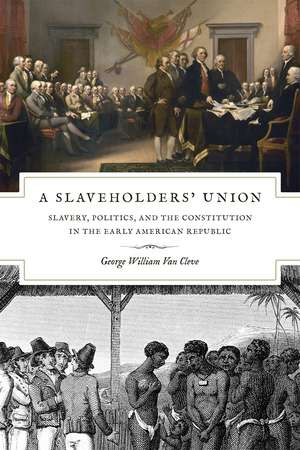A Slaveholders' Union: Slavery, Politics, and the Constitution in the Early American Republic
Autor George William Van Cleveen Limba Engleză Paperback – 30 noi 2011
In this powerful book, George William Van Cleve demonstrates that the Constitution was pro-slavery in its politics, its economics, and its law. He convincingly shows that the Constitutional provisions protecting slavery were much more than mere “political” compromises—they were integral to the principles of the new nation. By the late 1780s, a majority of Americans wanted to create a strong federal republic that would be capable of expanding into a continental empire. In order for America to become an empire on such a scale, Van Cleve argues, the Southern states had to be willing partners in the endeavor, and the cost of their allegiance was the deliberate long-term protection of slavery by America’s leaders through the nation’s early expansion. Reconsidering the role played by the gradual abolition of slavery in the North, Van Cleve also shows that abolition there was much less progressive in its origins—and had much less influence on slavery’s expansion—than previously thought.
Deftly interweaving historical and political analyses, A Slaveholders’ Union will likely become the definitive explanation of slavery’s persistence and growth—and of its influence on American constitutional development—from the Revolutionary War through the Missouri Compromise of 1821.
Preț: 202.21 lei
Nou
Puncte Express: 303
Preț estimativ în valută:
38.69€ • 41.38$ • 32.26£
38.69€ • 41.38$ • 32.26£
Carte disponibilă
Livrare economică 28 martie-11 aprilie
Livrare express 13-19 martie pentru 32.82 lei
Preluare comenzi: 021 569.72.76
Specificații
ISBN-13: 9780226846705
ISBN-10: 0226846709
Pagini: 408
Ilustrații: 1 line drawing, 2 tables
Dimensiuni: 152 x 229 x 25 mm
Greutate: 0.59 kg
Editura: University of Chicago Press
Colecția University of Chicago Press
ISBN-10: 0226846709
Pagini: 408
Ilustrații: 1 line drawing, 2 tables
Dimensiuni: 152 x 229 x 25 mm
Greutate: 0.59 kg
Editura: University of Chicago Press
Colecția University of Chicago Press
Notă biografică
George William Van Cleve is Scholar-in-Residence in the Department of History at the University of Virginia.
Cuprins
List of Illustrations
Introduction
Part 1 Slavery in the American Revolution
1 From Empire to Confederation
2 Abolition, Slavery Reform, and the Climate of Opinion
Part 2 The Making of the Slaveholders' Constitution
3 Property and Republican Representation
4 Sectional Bargaining and Moral Union
Part 3 Slavery in the New Nation
5 From Constitution to Republican Empire
6 The Missouri Compact and the Rule of Law
Conclusion: Slavery and the Dismal Fate of Madisonian Politics
Acknowledgments
Appendix A Notes on the Law of Slavery and Bound Labor
Appendix B Calculating Nonslaveholder Voting Strength
Appendix C Calculations in Support of Table 4.1
Appendix D House of Representatives Action on the Quaker Memorials
Abbreviations
Notes
Bibliography
Index
Introduction
Part 1 Slavery in the American Revolution
1 From Empire to Confederation
2 Abolition, Slavery Reform, and the Climate of Opinion
Part 2 The Making of the Slaveholders' Constitution
3 Property and Republican Representation
4 Sectional Bargaining and Moral Union
Part 3 Slavery in the New Nation
5 From Constitution to Republican Empire
6 The Missouri Compact and the Rule of Law
Conclusion: Slavery and the Dismal Fate of Madisonian Politics
Acknowledgments
Appendix A Notes on the Law of Slavery and Bound Labor
Appendix B Calculating Nonslaveholder Voting Strength
Appendix C Calculations in Support of Table 4.1
Appendix D House of Representatives Action on the Quaker Memorials
Abbreviations
Notes
Bibliography
Index
Recenzii
“This is a wide-ranging, deeply researched, well-written, and timely intervention into a subject area that has attracted the attention of scholars and the general public alike. George William Van Cleve argues emphatically and persuasively that ‘[t]he Constitution was pro-slavery in its politics, its law, and its economics.’ No one has made this point so clearly and with so much evidence and strong analysis to back it up. Van Cleve succeeds brilliantly in bringing slavery’s place in American political life to the fore, as well as allowing us a much better view of early American society and politics, and the nation’s progress toward empire. This book will be a dazzling addition to scholarship.”— Annette Gordon-Reed, author of The Hemingses of Monticello: An American Family, winner of the Pulitzer Prize and National Book Award for nonfiction
“A Slaveholders’ Union is likely to be a controversial book for the best reasons. George William Van Cleve’s bold, important thesis on the role human bondage played in the early years of the republic offers a powerful critique of the influence of slaveholding on American constitutional development from the Revolution to the Missouri Compromise. Time after time, Van Cleve demonstrates how powerful slaveholders protected vital interests in their human chattel as northerners remained indifferent, more focused on avoiding persons of color than emancipation. This book will challenge, and probably demolish, the inherited wisdom, particularly in the legal academy and general culture, that Abraham Lincoln correctly described these years as a time when slavery was thought to be on a ‘course of ultimate extinction.’ Americans from 1770–1820, a fair reader of this book should be convinced, never took any serious step that put slavery on a ‘course’ that keeps to Lincoln’s words.”—Mark Graber, author of Dred Scott and the Problem of Constitutional Evil
“Van Cleve’s treatment of the subject of slavery as central to nearly every aspect of political and legal life in the late eighteenth and early nineteenth centuries is so thoroughly researched and comprehensive that it becomes the definitive work on the subject. His hard-headed, political analysis of the practical politics of the Constitution provides a much needed and convincing refutation of the overly conspiratorial and moralistic cast of other books on the subject. On the whole, this is unquestionably the best account of slavery and the Constitutional Convention ever written.”—Richard R. Beeman, author of Plain, Honest Men: The Making of the American Constitution, winner of the George Washington Prize
“Interweaving historical and political analyses, Van Cleve demonstrates, in this account, that slavery was an essential part of the foundation of the American republic.”
